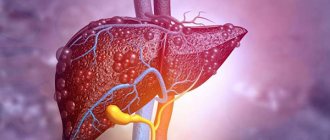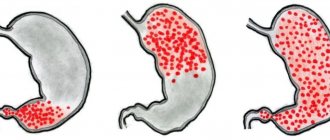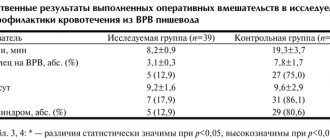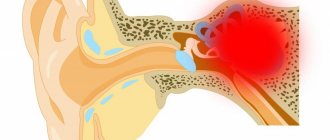Diseases of the digestive system: esophagitis, gastritis, peptic ulcer of the stomach and duodenum, duodenitis, enteritis, colitis, digestive disorders and others
The human digestive system performs various functions - processing food, extracting useful substances from it, ensuring their absorption into the bloodstream. Interruptions in the functioning of even one of the digestive organs can cause serious problems for the entire system. The causes of such disorders are modern ecology, new products and medications, stress, untimely nutrition, bad habits, and hereditary factors.
Digestive diseases affect people of all ages. Among the most common pathologies are esophagitis, gastritis, peptic ulcer of the stomach and duodenum, duodenitis, enteritis, colitis.
Cost of consultation?
| Name of service | Price, rub.) |
| Primary appointment with a general practitioner | 2000 rub. |
| Repeated appointment with a general practitioner | 1500 rub. |
| Initial appointment with a gastroenterologist | 2000 rub. |
| Secondary appointment with a gastroenterologist | 1500 rub. |
| Prescription of treatment (drawing up an individual treatment regimen) | 1500 - 3000 rub. |
All our services and prices
Esophagitis
Esophagitis
– damage to the mucous membrane of the esophagus, which can cause serious complications such as peptic ulcers, stenosis, Barrett’s disease. The main symptoms of esophagitis are impaired swallowing reflex, heartburn, and chest pain. Diagnosis of the disease includes x-rays of the organ, endoscopic biopsy, and laboratory blood tests. Treatment is prescribed strictly individually, taking into account the etiology of esophagitis and consists of drug therapy and a special diet. In severe cases, surgical intervention is possible.
Gastritis
Gastritis
– one of the most common diseases occurring in acute or chronic form in adults and children. These are inflammations of the gastric mucosa of different origins, which are characterized by pain in the epigastric region, heartburn, nausea, dyspepsia, bad taste and bad breath. An important condition for the treatment of gastritis is maintaining proper nutrition and diet, as well as taking medications and traditional medicine - infusions of chamomile, mint and other herbs. Patients are strictly prohibited from drinking alcohol!
CREON® capsules for better digestion
The digestive process is inextricably linked with pancreatic enzymes. These special substances perform an important role: they help the body digest and absorb food. Errors in nutrition, consumption of fatty foods or incompatible foods can affect your well-being and cause heaviness after eating, discomfort, and bloating. This happens when the body’s own strength (the usual amount of enzymes) is not enough to digest what is eaten.
Creon® contains digestive enzymes identical to those produced by the body3. By delivering them from the outside, the drug complements its own digestion and helps cope with the symptoms of indigestion: heaviness and discomfort after eating.
To learn more
Creon® is a convenient modern product in the form of capsules, each of which contains hundreds of small particles - minimicrospheres. Each of the Creon® particles does not exceed the size of 1.7 mm - they are so tiny3. This size is designated for a reason: modern scientific works, Russian and world scale, are unanimous that an effective enzyme preparation should have particles less than 2 mm in size5-8. Today, only Creon® meets the size requirements*4 and is therefore considered the first choice for better digestion, which cannot be said about the well-known drugs in tablet form**1,4,5,9. Their time, unfortunately, has passed, and today they are recognized as the least effective5,9.
The Creon® capsule has no equal:
No. 1 in the world
for better digestion10
15 minutes
and Creon® is maximally active11, 12
Peptic ulcer of the stomach and duodenum
Stomach ulcer
and
duodenum
- a chronic disease, which is characterized by the appearance of pathological foci on the mucous membrane of the organs. The causes of its occurrence are considered to be infection of the stomach and duodenum by bacteria, as well as irregular nutrition, stress, prolonged use of medications, hypersecretion of gastric juice, and smoking. The main symptoms of the disease are frequent pain in the upper abdomen, especially on an “empty” stomach. Peptic ulcers of the stomach and duodenum are dangerous due to their complications - internal bleeding, perforation of the intestinal walls with penetration of its contents into the abdominal cavity and the development of peritonitis, as well as stenosis (intestinal obstruction). Treatment is carried out under the supervision of a gastroenterologist. Self-medication is prohibited! To suppress infection, antibacterial drugs are used, as well as antacids and gastroprotective agents. Throughout the course, you should adhere to a diet, stop smoking and drinking alcoholic beverages.
Treatment of indigestion
Basic principles of treating digestive disorders2:
- adjusting the diet towards a healthy and nutritious diet.
- healthy sleep (for an adult 7-9 hours).
- giving up alcohol and smoking, which irritate the mucous membrane of the stomach and intestines, maintaining a constant inflammatory process. If sudden changes in lifestyle are difficult, you need to at least limit bad habits. For example, reduce the number of cigarettes you smoke.
The main goal of treatment is to restore the natural process of food digestion, eliminate digestive problems, and relieve symptoms. To do this, the following rules must be observed:
1. It is not recommended to overeat before bed, because... food can take a long time to pass through the digestive tract and cause discomfort.
2. Nutrition should be complete and varied, consisting of foods high in fiber.
3. In cases of malnutrition (for example, when eating a lot of fatty foods), digestion can be supported with special medications.
Duodenitis
Duodenitis
– inflammation of the mucous membrane of the duodenum, affecting its upper and/or lower sections. The main symptoms are general weakness, pain in the stomach, heartburn, nausea, belching. If you follow a gentle diet, acute manifestations usually end after a few days. The chronic form of duodenitis is characterized by frequent relapses. With untimely medical care and proper treatment, complications such as intestinal bleeding, perforation of the intestinal wall, and pancreatitis may occur.
| 21.12.2018
Diseases of the digestive system are not only relevant for all groups of the population, but are also among the most common compared to diseases of other organs. Thus, peptic ulcer disease (which occurs in people of any age) affects 5-7% of the population of our country, and the overall percentage of diseases of the digestive system is no less than 9-10%! In addition, the popular belief that diseases of the digestive system are more likely to be unpleasant, but not very life-threatening diseases, is not justified. A significant share in the overall statistics of oncological diseases is also made up of mortality from malignant tumors of the large intestine and stomach - 12% of the total number of deaths from cancer, respectively. Such disappointing indicators indicate that adherence to the rules of a healthy lifestyle is necessary: this factor is decisive for the health of the digestive system.
THE MOST COMMON DISEASES OF THE DIGESTIVE SYSTEM • Gastritis. Gastritis affects 50-80% of the entire adult population; With age, the likelihood of developing gastritis increases. • Stomach ulcer. Occurs in 5-10% of the adult population; Urban residents suffer from peptic ulcers more often than rural residents. • Cholelithiasis. Up to 10% of the adult population of our country suffers from cholelithiasis, and after 70 years it occurs in every third person. • Pancreatitis. The incidence of chronic pancreatitis averages 0.05% of the total population. • Colon cancer. Mortality from malignant neoplasms of the large intestine is 12% of the total number of deaths from cancer.
RISK FACTORS
Risk factors can be divided into two types according to the effectiveness of their elimination: irremovable and avoidable. Fatal risk factors are those that cannot be changed. Avoidable risk factors, on the other hand, are those that can be changed by taking appropriate measures or making adjustments to your lifestyle. FATAL • Age. The risk of digestive system cancer is increased in men over 50 years of age, the risk of peptic ulcer disease is increased in men aged 20-40 years, and the risk of gallstone disease is increased in women over 40 years of age. • Floor. Stomach cancer develops 2 times more often in men, while gallstone disease develops 3-5 times more often in women. • Heredity. If parents or other close blood relatives have had peptic ulcers or stomach and colon cancer in the past, the risk of developing the corresponding diseases increases. REMOVABLE • Excess weight. Overweight most strongly affects the development of diseases such as pancreatitis, gallbladder cancer and cholelithiasis. Typically, the risk of developing digestive diseases increases significantly even with a slight excess of the normal value of the body mass index. • Alcohol abuse. Such a bad habit as a morbid addiction to alcohol doubles the risk of developing stomach ulcers and stomach cancer. Alcoholism is also a direct path to pancreatitis, hepatitis and cirrhosis of the liver. In general, alcohol has a destructive effect on the entire digestive system and is a catalyst for all related diseases. • Smoking. Definitely one of the decisive factors in the development of stomach ulcers. For existing peptic ulcers, treatment does not produce significant results if the person continues to smoke. • Poor nutrition. An abundance of fatty and fried meat, red meat, fast food, an excess of carbohydrates (especially simple ones), smoked and salted meat and fish, marinades, preservatives in the diet - all this significantly increases the risk of developing stomach cancer and other diseases of the digestive system. • Dietary disorder. Refusal of breakfast, long breaks in eating (more than 4-5 hours), eating before bed, drinking soda on an empty stomach and other eating disorders contribute to the development of all types of digestive diseases - from relatively harmless gastritis to stomach cancer. • Stress. In an organism experiencing stress or nervous tension, a spasm of capillaries occurs—in this case, the capillaries of the stomach. This prevents the secretion of mucus that protects the mucous membrane. Gastric juice corrodes the mucous membrane and tissue of the stomach, which leads to the formation of ulcers - and, consequently, to the development of peptic ulcers. In addition, stress causes an imbalance in the intestinal microflora, which means dysbiosis. • Diabetes. 50% of patients with diabetes develop various diseases of the digestive system. The most common diseases for diabetic patients are chronic gastritis, gastroduodenitis, colitis, hypersecretion with high acidity, achylia, and dysbacteriosis. Specific to patients with diabetes are diabetic enteropathy, diabetic hepatopathy and diabetic neurogenic gallbladder. • Abuse of coffee and carbonated drinks. Coffee contains chlorogenic acids, which can cause heartburn and irritation of the stomach lining. As for the abuse of carbonated drinks (exceeding the dose is considered to be the consumption of more than 1 liter of drink per day), the negative effect is manifested in the irritating effect of carbon dioxide on the walls of the stomach, which, in turn, leads to the development of gastritis, ulcers, etc. • Low physical activity. Lack of movement, and therefore lack of tone, makes it difficult for the body to combat negative factors. This also applies to issues of general fitness, immunity, and specific problems - for example, weakness of the abdominal wall muscles. • Binge eating. When eating too much food, the stomach is not able to produce enough gastric juice, so the food is not processed and absorbed fully. This leads to problems and then diseases of the digestive system. PREVENTION • It is necessary to put your diet in order. Eat more often, but in smaller portions, be sure to have breakfast, and do not skip meals. Be sure to thoroughly wash your hands and all non-cooked foods before eating to protect your body from pathogenic bacteria. • Eat right. Reduce consumption of fatty, smoked, fried, salty foods, smoked foods, drink as little carbonated drinks as possible. On the contrary, increase the dose of fiber in your diet (porridge, bran bread, vegetables, fruits), eat as many fresh salads and coarse fiber foods as possible, salt food in moderation, try to use less vinegar and similar ingredients when cooking. • Don't overeat. Eat in moderation; remember that a standard serving does not exceed 400 ml (300 ml for women) of food if presented in liquid form. Don’t force yourself to starve, eat healthy and orderly. • Control your weight. If a person is overweight, try to reduce it, but only do it correctly (weight loss should occur with an intensity of losing kilograms of no more than 0.5 (for women) and 1 (for men) kg per week), so as not to cause further damage to the digestive system. more harm. • Quit alcohol or reduce its consumption to a minimum. The maximum safe dose of alcohol consumption is 20 ml of ethanol (for women) and 30 ml of ethanol (for men) per day. Remember that low-quality alcohol containing various chemical components, dyes, excess sugar, flavorings or preservatives has an extremely detrimental effect on the digestive system! Drink only the most natural, high-quality and pure alcohol possible, or better yet, give it up altogether. • Quit smoking. When it comes to smoking, there is no “normal” dose. To truly reduce the harmful effects of nicotine and tar on your digestive system, you need to quit smoking.
- If a person has diabetes, they need to control their disease. Follow all the recommendations of your doctor, eat right, carefully monitor your health, monitor your blood sugar levels. If you experience pain in the digestive organs, consult your doctor immediately to avoid complications. • Limit consumption of coffee and carbonated drinks. The norm for safe coffee consumption per day is 300-400 ml of ready-made natural coffee (2-3 coffee cups). Drink as little carbonated drinks as possible: it is advisable to limit yourself to one glass a day or completely stop drinking them. • Move more. The norm of physical activity for an adult is 150 minutes per week; you need to move more, try not to be nervous, learn to cope with stress, walk, get enough sleep, and rest. Such measures not only indirectly affect the health of the digestive system, but also improve overall health.
MEDICAL CONTROL
In addition to self-prevention of diseases of the digestive system, an important element of monitoring health status in this area is timely and professional medical control. In order not to miss a disease that has begun to develop or even just a worsening condition, in order to keep their chronic diseases under control, patients should regularly undergo the following types of medical examinations: - Examination by a general practitioner once a year. — At each visit to the doctor, determine your body mass index (BMI). — Determination of cholesterol levels once every 5 years (or more often at the discretion of the doctor). - Over the age of 50 - colon cancer screening.
GP (Head) T.I. Emelyanchik
GP of therapeutic department No. 3 A.Yu.Petsevich
Reporting trade union conference
Meeting with interns and young specialists
Enteritis
Enteritis
– a set of inflammatory processes that occur in the small intestine and are accompanied by disruption of its function. The main symptoms are upset stool, bloating, pain in the navel, general weakness, pale skin. The causes of the disease are intestinal infections, poisoning with toxic substances, overeating spicy or fatty foods, and a tendency to allergies. Enteritis may be a consequence of other diseases of the gastrointestinal tract. The diagnosis is made on the basis of bacteriological examination of stool, biochemical blood test, and X-ray examination of the intestines. Acute enteritis is treated in a hospital. The patient is prescribed bed rest, dietary nutrition, enzyme preparations, as well as decoctions of chamomile, mint, and blueberries.
Symptoms of indigestion
Digestive disorders can manifest themselves in various symptoms2:
- rumbling in the stomach, flatulence;
- heaviness in the stomach after eating;
- abdominal pain;
- constipation, diarrhea, feeling of incomplete bowel movement;
- nausea, vomiting.
Symptoms of digestive disorders in children can appear even after minor overeating or changes in the usual diet, since the children's digestive tract can be sensitive to unusual foods. If a child's indigestion is caused by a bacterial or viral infection, signs of intoxication may appear or the temperature may rise2. In teenagers, digestive problems may arise due to frequent snacks on the run or fast food, which can lead to problems such as gastritis or duodenitis. Gastritis is a familiar name, but duodenitis may sound scary. In fact, everything is simple: duodenitis is associated with an inflammatory process in the intestines, which, in turn, can lead to poor digestion of food. This occurs due to the fact that digestive enzymes, which help the body break down and absorb food, “suffer”2.
A similar relationship (inflammation in the intestines and digestive problems) can also occur in other conditions, for example, intestinal infections, allergic reactions, rotavirus infections, etc.2.
Colitis
Colitis
– pathological changes in the mucous membrane of the colon due to infectious, toxic, drug damage. The main symptoms are severe pain, diarrhea, constipation, flatulence. To make a correct diagnosis and prescribe medications, stool examinations for the presence of helminths and protozoa, colonoscopy, biopsy, and laboratory blood tests are performed. Treatment is prescribed taking into account the results obtained and includes taking antibacterial drugs, enzymes, probiotics, as well as herbal medicine and dietary nutrition.
Sign up for a consultation
Make an appointment
Creon minimicrospheres® - what are their advantages?
1. Complete digestion of food. When it enters the stomach, the Creon® capsule quickly dissolves, and the smallest particles are evenly mixed with food3,12. This allows them to participate in the digestion of the maximum amount of food eaten.
2. 1 capsule of Creon® 10000 - this may be enough for heaviness after eating3. The number 10,000 indicates the amount of the lipase enzyme, which is responsible for the breakdown of fats. For comparison: in some well-known tablets the lipase content does not exceed 3,500 units, this is almost 3 times less than Creon® 10 0003. That is why their instructions for medical use indicate that an additional 2 to 4 may be required 13 tablets per dose.
More information about the action of the drug and its advantages over analogues can be found here. Creon® is recommended to be taken with meals or immediately after3.
Where can you get examined, prevented and treated for diseases of the digestive system in Moscow?
In a multidisciplinary medical center you can always undergo examination, prevention and treatment of diseases of the digestive system
. Our medical center is located between the Konkovo and Belyaevo metro stations (South-Western Administrative District of Moscow in the area of the Belyaevo, Konkovo, Teply Stan, Chertanovo, Yasenevo, Sevastopolskaya, New Cheryomushki metro stations " and "Trade Union"). Here you will find highly qualified personnel and the most modern diagnostic equipment. Our clients will be pleasantly surprised by our quite affordable prices.
Causes of indigestion
Each organ of the digestive system takes part in the digestion of food and the removal of metabolic products from the body2.
The most common causes of indigestion are 2:
- the habit of eating in a hurry, on the run;
- the predominance of fats and simple carbohydrates, semi-finished and instant foods in the diet;
- lack of plant products in the diet (vegetables, fruits, legumes and whole grains);
- lack of digestive enzymes resulting from poor nutrition, inflammation in the intestines, disruption of the digestive system;
- constant stress.
Digestion is one of the steps of another complex and vital process, metabolism. Failures in the process of digesting food (digestive disorders) not only add physical inconvenience, they can significantly affect well-being.







